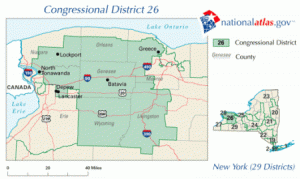Samuel Greenholtz, a retired manager from Verizon, offered this absolutely impenetrable thinking on why broadband providers needed to impose caps on customers and were forced to charge way too much for them:
While a tiered pricing structure may have been inevitable in the long run, if the corporate bashing horde stayed out of the way, the vast majority of users would have avoided paying more for additional capacity. Time Warner Cable does give the politicians what they are looking for – more bandwidth availability for all of its subscribers. Still, the lowest speed package is not going to be enough for most of the consumers – and so they will have to take the higher tier offerings — along with the new overage charges. Had the MSOs been allowed to just cap excessive users, most of the subs would have continued to receive a reasonable amount of bandwidth at the same flat price.
Ironically, all of the illogic obsession with net neutrality will result in even more of a usage-based pricing scheme. There will now be several layers of capping. The anti-ISP crowd has actually created a more beneficial pricing system for these companies. And there is certainly nothing unfair about this development. But the clamoring for so-called equality resulted in an acceleration of the removal of the all-you-can-eat advantage for consumers.
What in the world is this man talking about, and why is he part of some so-called “expert network,” Gerson Lehrman Group?

Broadband Providers: How Low Can They Go?
The history of usage capping actually goes back into the earliest days of Internet service providers, providing both dial-up and broadband service in areas where network capacity simply didn’t allow customers to utilize unlimited bandwidth. Some Time Warner customers in the midwest and central part of the country lived under “limits” for years, mostly due to lack of any viable competition. The imposition of caps on customers has always been driven by the capacity argument, never by a more honest claim that lack of competition discourages significant upgrades, and allows a provider to limit usage to ensure a higher rate of return. Where competition exists offering similar types of service, caps and limits are much rarer, speeds are higher, and pricing is lower. A provider that doesn’t regularly invest in upgrades to his network in a competitive marketplace will soon no longer be a part of that marketplace.
Today, a handful of major broadband providers are now colluding in a version of telecommunications limbo, with several watching each of the others “experiment,” to see how low a cap they can set before subscribers and public officials rebel. Multichannel News columnist Todd Spangler literally wrote that “Time Warner is taking one for the team.”
The “corporate bashing horde” argument, which Greenholtz casually tosses out without any examples or proof, doesn’t hold water. No group I am aware of has ever bashed the widespread deployment of broadband service from multiple providers. Oh wait, there is one. Those providers themselves when they attempt to squelch community cooperative broadband services or municipally-run wi-fi networks, run for the benefit of residents.
Greenholtz completely ignores the fact broadband service is almost entirely unregulated, and providers have always been free to set terms and prices. Someone draw me a map where corporate critics have developed the leverage to force operators to impose usage caps and tiered pricing.
The net neutrality issue that comes into his argument stems from the Comcast controversy a few years ago, when the nation’s largest cable operator attempted to manage traffic on its network by “throttling,” or limiting the speed of customers using certain bandwidth intensive applications. Comcast claimed they were primarily targeting peer-to-peer software, which allows users to exchange files with one another, during peak usage of their network.
But this came about at the same time several large corporate broadband providers were advocating for a new distribution system for the Internet, one that would potentially no longer provide an equal level of priority for data traveling across the Internet. Opponents feared that broadband providers could discriminate or even throttle traffic that didn’t pay their asking price. And then Comcast provided the net neutrality opponents with a real-world example of bandwidth throttling in action.
Comcast abandoned, at least for now, the bandwidth management approach that included throttling, and instead imposed a simple 250GB “limit” on residential accounts. Those exceeding that amount of usage risked having service suspended.
Mr. Greenholtz fails to connect this event with any cogent argument or evidence that suggests multiple capped tiers were borne as a result of this controversy. Indeed, until Time Warner “took one for the team,” other domestic broadband providers simply upgraded their networks to handle capacity issues and imposed no caps, or have simply asked residential users to limit their usage, mostly between 150-250GB per month. Customers seeking more than that can purchase another account, move to a business plan, or switch to another provider, where available. Curiously, the imposition and testing of lower limits has often been in areas where competitors either do not exist or cannot offer an equivalent level of service at the same price across an entire community.
But Greenholtz does say one thing that has been obvious to all of us: the Internet service provider is using this as an excuse to create a “more beneficial pricing system.” Of course, it’s only beneficial to them, not to consumers. The latter routinely object in overwhelming majorities to the concept of usage caps and the elimination of the existing flat rate pricing which has always been profitable for the broadband industry. Any other connection, particularly with the absence of any evidence, is tenuous at best.


 Subscribe
Subscribe




